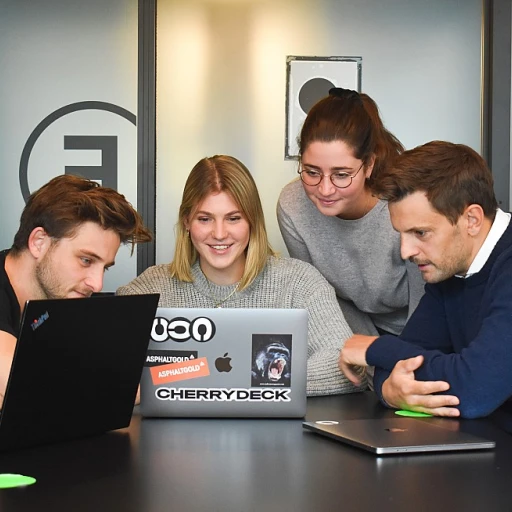Understanding the Role of Employer Branding in MSP Staffing
The Importance of Crafting a Strong Employer Brand in MSP Staffing
In today's competitive job market, establishing a strong employer brand is crucial for organizations, especially in the Managed Service Provider (MSP) staffing sector. A well-defined employer branding strategy can significantly influence an organization's ability to attract and retain top talent. Companies with a compelling employer brand can effectively communicate their culture, values, and unique job proposition to potential candidates. For MSP staffing, distinguishing your brand amidst a sea of competitors is not just about delivering on client projects but also about how your current employees and potential candidates perceive your work environment. An engaging company culture and positive employee experience reflect the organization’s core values and help build a strong employer identity. Achieving effective branding involves a strategic blend of marketing and human resource efforts. By aligning these, companies can ensure their messaging resonates with job seekers across various touchpoints, including social media and other digital platforms. This helps create consistent and appealing content that accentuates the value of the employment experience at your company. Moreover, effective employer branding requires continuous efforts in enhancing employee engagement and satisfaction to project a positive image. Exceptions like employee testimonials, case studies, and authentic content showcasing a day in the life of an employee can significantly impact how job seekers view your company. For those interested in further exploring how to find the right staffing solutions reflective of a strong employer brand, check out this detailed resource. It provides insights on aligning your HR programs with broader business objectives, underpinning a strong employer brand that attracts top talent.Key Elements of Effective HR Programs
Key Components of Designing Effective HR Programs
Developing HR programs that resonate with a company's objectives requires a thoughtful and strategic approach. The intent is to create an environment where both the employer brand and organizational goals align seamlessly. Here are some components crucial to the success of HR programs:- Values-Based Culture: A company's culture and values are fundamental to its branding strategy. It is essential to cultivate an environment that reflects these values, thereby attracting top talent that shares similar principles. Fostering a positive work culture encourages employee engagement and retention, further strengthening the employer's brand image.
- Employee Experience: An employee's journey within the organization significantly impacts employer branding. Attention should be paid to employee touchpoints right from the recruitment process to daily work routines. Emphasizing a supportive work environment that highlights growth opportunities contributes to a positive employee experience.
- Social Media and Communication: In the digital age, leveraging platforms such as social media amplifies a company’s employer brand. Sharing authentic stories and showcasing company culture through engaging content can attract potential candidates and reinforce the brand's reach.
- Comprehensive Employee Value Proposition (EVP): A well-defined EVP that clearly communicates the benefits and values offered by the company is vital. It serves as a promise to employees and potentials, outlining why the organization is an employer of choice.
Aligning Marketing Strategies with HR Objectives
Creating Synergy Between Marketing and HR
Aligning marketing strategies with HR objectives is a crucial step for any company looking to foster a strong employer brand. The synergy between marketing and HR can be impactful in attracting top talent. By effectively branding the company culture and values, organizations can position themselves as employers of choice in a competitive job market. An effective branding strategy should reflect the company's core values and employee experience and extend beyond traditional HR methods. It involves crafting a compelling employee value proposition (EVP) that resonates with potential candidates. Organizations should leverage content that highlights the uniqueness of their work environment and culture values. Moreover, consistency in messaging is key. This ensures that current employees feel aligned with the company's goals and potential candidates have a clear understanding of the company brand. Marketing teams can support HR by creating engaging content that shares the company culture across various channels.Utilizing Social Media to Amplify Employer Branding
Social media platforms have emerged as powerful tools for reinforcing the employer brand. They allow companies to share behind-the-scenes content showcasing the daily work life, fostering a connection with job seekers. Highlighting stories of employee achievements and cultural events can paint a picture of what it’s like to be part of the organization. Companies that excel at employer branding use social media to engage with prospective talent directly, providing a more personalized recruitment process. This interaction can significantly enhance the candidate experience, aligning with the insights from Exploring Industrial Staffing Solutions in New Jersey. In conclusion, the collaboration between marketing and HR departments is pivotal in shaping the employer brand. By strategically aligning objectives and harnessing the power of social media, companies can successfully attract and retain top talent.Leveraging Technology to Enhance Employer Branding
Using Technology as a Catalyst for Better Branding Strategies
In today’s competitive job market, leveraging technology is essential for developing a strong employer brand. With employer branding gaining significance in the recruitment process, companies must embrace technological advancements to attract top talent effectively. Technology plays a central role in bridging the gap between potential candidates and organizations, creating a more engaging and streamlined candidate experience. One way to harness technology is through the use of data analytics. By analyzing patterns and trends, companies can better understand what attracts job seekers and how they can refine their employer branding strategies. For instance, if certain values or aspects of the company culture resonate well with past successful hires, these can be highlighted to attract similar candidates. Additionally, technology enables organizations to create engaging content that showcases the work environment and culture values authentically. This content can be circulated through social media, providing a window into the company for job seekers. Effective use of social media can bolster a company's branding strategy by promoting a positive work environment and an enticing employee experience. Enhancing the recruitment process through technology also means optimizing the proposition EVP. Carefully crafted job descriptions with clear EVP attract potential candidates more effectively. Interactive platforms that allow candidates to engage with current employees can provide insights into the company's work culture, promoting employee engagement among prospective hires. Furthermore, utilizing integrated HR software simplifies the management of the entire recruitment and branding strategy. From tracking applications to automating communication, these tools ensure consistent and quick responses. A seamless recruitment process not only enhances the candidate’s experience but also strengthens the overall employer brand. In essence, embracing technology allows companies to create a robust employer brand that stands out in the job market. As organizations continue to innovate in their marketing and HR strategies, they will find themselves well-positioned to attract and retain top talent effectively.Case Studies: Successful Employer Branding in MSP Staffing
Stepping into the Limelight: Inspiring Employer Branding Success Stories
Creating a captivating employer brand is no small feat, particularly in the dynamic world of MSP staffing. However, companies that have mastered this art reveal that a strategic blend of authenticity, innovation, and alignment with company values can lead to significant accomplishments. These real-world case studies demonstrate how investing in a strong employer brand can redefine recruitment, employee engagement, and ultimately drive business success.- Transforming Company Culture into a Powerful Attraction Tool: An organization known for its vibrant company culture has effectively turned its work environment into a brand asset. By showcasing authentic employee stories and day-to-day culture values through social media channels, they have doubled their organic job inquiries from top talent in the job market.
- Crafting an Experience-Centric Employee Proposition: Another standout example focuses on redefining the employee experience. By investing in a comprehensive employee engagement strategy that aligns with the company's strong principles, this organization created a compelling proposition EVP (Employee Value Proposition). The result was a 30% increase in candidate retention and a noteworthy enhancement in current employees' job satisfaction.
- Leveraging Content Marketing for Talent Acquisition: By aligning marketing strategies with HR objectives, a leading company capitalized on content marketing to articulate their employer branding message. Through insightful, relevant content tailored to potential candidates' interests, the company has successfully shortened its recruitment process while attracting top-tier talent.
Challenges and Solutions in Implementing HR Programs
Overcoming Hurdles in Employer Branding Initiatives
Implementing effective HR programs to bolster employer branding within MSP staffing is not without its challenges. One prominent hurdle is aligning the HR initiatives with the overarching business objectives. Companies often struggle to synchronize their branding strategy with their recruitment process, resulting in a disjointed experience for both potential candidates and current employees. To address this, organizations should focus on clear communication and strategic cooperation between departments.
Another challenge lies in maintaining a strong employer brand in diverse work environments. With the rise of remote work and hybrid models, companies must ensure their company culture and values are effectively communicated through digital channels. Social media and employee engagement platforms can be powerful tools in conveying the organization’s culture values and enhancing the employee experience.
Furthermore, the competitive nature of the job market demands that companies continuously refine their attraction strategies to appeal to top talent. Approaching recruiting as an integral part of your employer marketing can go a long way in ensuring your content stands out to job seekers. This involves not only creating appealing job descriptions but also highlighting the unique aspects of your work environment and employee value proposition (EVP).
Lastly, integrating technology with traditional HR processes presents its own set of obstacles. Leveraging tech appropriately can lead to a more streamlined recruitment process, enhancing the overall candidate experience. To ensure long-term success, it’s crucial to invest in learning and development initiatives that keep your team up-to-date with the latest HR tech innovations.








